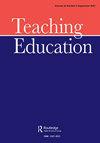幼儿园教师与家长“分享对话”:实践在培养过程中建立信任的重要性
IF 1.1
Q2 EDUCATION & EDUCATIONAL RESEARCH
引用次数: 1
摘要
摘要有效的学校-家长合作关系符合孩子的最大利益。然而,家长与教师关系的复杂性要求教师接受家长沟通技能的培训。在这里,我们从教育受训者的角度探讨了影响亲子关系的因素,他们被要求与父母沟通,帮助有困难的孩子掌握社交技能。在这项定性研究中,我们对四名实习幼儿园教师、三名幼儿园教师培训师和三名家长进行了半结构化访谈的主题分析,他们都参与了这种沟通过程。我们的研究结果表明,许多教师尽量减少家长与教师的沟通,以避免与家长发生潜在冲突,这一点被受训人员模仿。然而,经验丰富的幼儿园教师对自己的技能和家长的尊重充满信心,对实习教师和家长之间的沟通持开放态度,调解这些沟通,并发现这些沟通很有用。研究结果支持了其他文献中提到的观点,即未来教师培训应侧重于家长与教师沟通技能的监督实践,以促进“共享对话”。本文章由计算机程序翻译,如有差异,请以英文原文为准。
Kindergarten teachers and ‘sharing dialogue’ with parents: The importance of practice in the process of building trust in the training process
ABSTRACT Effective school-parent partnerships are in the child’s best interests. Nevertheless, the complexity of the parent-teacher relationship requires the teachers to be trained in parent communication skills. Here, we explore factors that affect the parent-teacher relationship from the perspective of education trainees, who were required to communicate with parents to help children with difficulties with their social skills. In this qualitative research, we used thematic analysis of semi-structured interviews with four trainee kindergarten teachers, three kindergarten teacher trainers, and three parents, all involved in such communication processes. Our findings reveal that many teachers minimized parent-teacher communication to avoid potential conflict with parents, and this was mimicked by trainees. However, more experienced kindergarten teachers, confident in their skills and in the respect of parents, were open-minded about communications between trainee teachers and parents, mediated these communications, and found them useful. The findings support the idea mentioned in other literature that training of teachers in future should focus on supervised practice of parent-teacher communication skills to promote a ‘sharing dialogue’.
求助全文
通过发布文献求助,成功后即可免费获取论文全文。
去求助
来源期刊

Teaching Education
EDUCATION & EDUCATIONAL RESEARCH-
CiteScore
3.80
自引率
6.20%
发文量
15
期刊介绍:
Teaching Education is an interdisciplinary forum for innovative practices and research in teacher education. Submission of manuscripts from educational researchers, teacher educators and practicing teachers is encouraged. Contributions are invited which address social and cultural, practical and theoretical aspects of teacher education in university-, college-, and school-based contexts. The journal’s focus is on the challenges and possibilities of rapid social and cultural change for teacher education and, more broadly, for the transformation of education. These challenges include: the impact of new cultures and globalisation on curriculum and pedagogy; new collaborations and partnerships between universities, schools and other social service agencies; the consequences of new community and family configurations for teachers’ work; generational and cultural change in schools and teacher education institutions; new technologies and education; and the impact of higher education policy and funding on teacher education. Manuscripts addressing critical and theory-based research or scholarly reflections and debate on contemporary issues related to teacher education, will be considered. Papers should attempt to present research, innovative theoretical and/or practical insights in relevant current literature and debate.
 求助内容:
求助内容: 应助结果提醒方式:
应助结果提醒方式:


